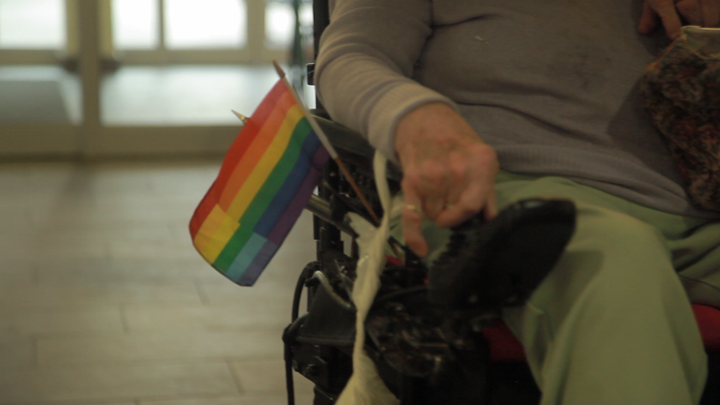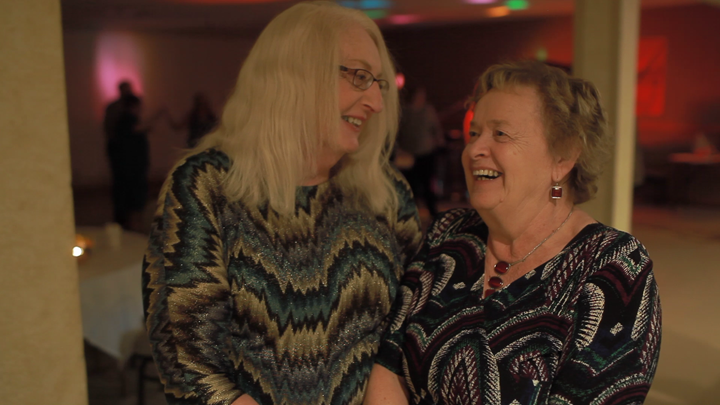Baby boomers have seen 12 Canadian prime ministers, the birth of the Canadian health care system and watched rights for LGBT (lesbian, gay, bisexual and transgender) people fought for, and won. But now as they age, many worry that those gains will not make it to the nursing home.

“People are not being treated the same,” says Bill Ryan, a professor of social work at McGill University. He has been studying LGBT health for 25 years and says many healthcare providers, long term care facilities and retirement homes simply do not know that some of their residents could be LGBT.
“If these places have more than 20 or 30 residents, they have people that are LGBT,” he says. “Just because someone doesn’t name their reality, doesn’t mean they aren’t there.”
When entering care, many LGBT seniors are afraid they will experience homophobia or discrimination because other residents or health care workers may not agree with their lifestyle. Ryan says some will conceal their sexuality and go back in the closet.
“…this man said when he went to visit his partner he would walk into the room and he would close the door and lock it, then he would go to the bed and he would help his partner into the bathroom and he would walk into the bathroom and close the door and lock it so 2 locked doors between them and anybody else and he would just hold him and hug him”, says Ryan. “It’s horrible not to show affection”.
The number of seniors in Canada is set to double in the next 25 years, up to 25 percent of the total population by 2036. Current research estimates that up to seven per cent of the senior population is openly LGBT. And the generation that fought for rights decades ago is set to demand the same equal treatment when their time comes for senior care.
Right now that equal treatment doesn’t always happen. Discrimination can be a dirty look from staff, a homophobic slur from another resident or facilities that do not acknowledge LGBT relationships.
WATCH BELOW: Lorraine, who realized she was transgender at 62 years old, talks about her relationship with her wife, Joyce.
“Regardless of what your policies are, regardless of what your thinking is, this is what our relationship is. This is who I am to her and who she is to me and this is how we want our relationship to be respected,” says Lorraine Sayell, 68.
Lorraine was born Lorne in 1946 and six years ago, at 62 years of age, she realized she was transgender, a woman born in a man’s body. She quickly transitioned: changed her name, got new ID, started taking hormones and came out to her wife Joyce after 47 years of marriage.
They refer to each other as “wife” and have started a new life for themselves as two women. They also want the same respect for their relationship if they enter long-term care.
WATCH BELOW: After 47 years of marriage, Joyce’s partner realized she was transgender. Today, the couple is still together.
According to Ryan, if they are ignored, it could become a human rights issue. “..if (homes) don’t change because it’s the right thing to do then the courts will be telling them that they’re acting in a way that’s unconstitutional.”
The answer, Ryan says, is in creating LGBT-friendly environments, where people want to come out. That includes asking residents how they identify, not assuming everyone is straight.
“It’s not that hard,” says Ryan.
Toronto’s Fudger House, a downtown long-term care facility, became gay positive in 2004. Becoming gay friendly includes training staff in diversity, creating LGBT friendly activities and programs to be more inclusive.
“In order to respond to the needs of our residents we thought we need to explore and travel the journey of improving, to make sure we are gay positive,” says Lorraine Siu, Fudger House’s administrator.
WATCH BELOW: Alf Roberts says he knew he was gay when he was in his 20s but he only came out of the closet five years ago – at 80 years old.
Alf Roberts, 85, is one of the 249 residents at Fudger House. Five years ago, when he moved in, he came out of the closet and admitted he was a homosexual.
It was a secret he had kept his whole life. But he finally felt comfortable enough at Fudger House to be himself.
But he is one of the lucky ones.
“I just hope that more homes across Canada will open themselves to LGBT groups,” Alf says. “As long as they feel they don’t have to go back into the closet that’s the big thing”.
16×9’s “Pride and Prejudice” airs this Saturday at 7pm.
- ‘Shock and disbelief’ after Manitoba school trustee’s Indigenous comments
- ‘Super lice’ are becoming more resistant to chemical shampoos. What to use instead
- Is home ownership only for the rich now? 80% say yes in new poll
- Invasive strep: ‘Don’t wait’ to seek care, N.S. woman warns on long road to recovery






Comments